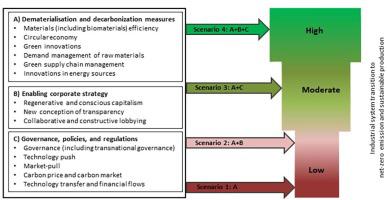Global Environmental Change ( IF 8.6 ) Pub Date : 2021-08-25 , DOI: 10.1016/j.gloenvcha.2021.102349 Pramod K. Singh 1 , Harpalsinh Chudasama 1

|
The concept of industrial system transition introduced in the IPCC special report on Global Warming of 1.5 °C remains poorly conceptualized. In this paper, we deepen the conceptualization of the industrial system transition to decarbonization, dematerialization, and sustainable industrial production. Aided by fuzzy cognitive maps that use perception-based data from stakeholders to model complex and difficult-to-model systems, we chart the pathways for industrial system transition. The industrial system transition entails interactions between dematerialization and decarbonization goals while enabling governance and systemic corporate strategies. The respondents of the fuzzy cognitive maps-based surveys comprised practitioners from companies, authors, and the policymaking community. Fuzzy cognitive map-based simulations reveal that resorting to technical measures of dematerialization and decarbonization is insufficient to accomplish industrial system transition. The efficient industrial system transition to dematerialization and decarbonization requires the combined measures of (i) dematerialization and decarbonization, (ii) governance, policies, and regulations (effective governance including transnational governance, technology push, market-pull, technology transfer and financial flows, carbon price and carbon market; and (iii) enabling corporate strategies (regenerative and conscious capitalism, a new conception of transparency, and collaborative and constructive lobbying). Large companies are mostly transnational entities, necessitating the adoption of effective transnational governance strategies for achieving the objectives of dematerialization and decarbonization. Several transnational governance networks have partnered under the public–private co-governance mechanism in the decarbonization space dominated by mainly larger players. The advent of polycentric governance provides new opportunities for trans-local governance where large numbers of small and medium enterprises can participate in the advancement of at least decarbonization objectives; however, such networks require support from national governments. Besides implications for governance, policy and regulations, the findings of this research could also have implications for corporate behavior in terms of promoting conscious and transparent organizational culture.
中文翻译:

为非物质化和脱碳的世界构想并实现工业系统转型
IPCC关于全球变暖1.5°C的特别报告中引入的工业系统转型概念仍然缺乏概念化。在本文中,我们深化了工业系统向脱碳、非物质化和可持续工业生产转型的概念化。借助使用利益相关者基于感知的数据对复杂且难以建模的系统进行建模的模糊认知图,我们绘制了工业系统转型的路径。工业体系转型需要去物质化和脱碳目标之间的相互作用,同时实现治理和系统性公司战略。基于模糊认知图的调查的受访者包括来自公司、作者和决策社区的从业者。基于模糊认知图的模拟表明,仅靠去物质化和脱碳的技术措施不足以完成产业体系转型。有效的产业体系向非物质化和脱碳化转型需要(i)非物质化和脱碳,(ii)治理、政策和法规(有效治理包括跨国治理、技术推动、市场拉动、技术转让和资金流动,碳价格和碳市场;以及 (iii) 支持企业战略(再生和有意识的资本主义、透明的新概念以及协作和建设性游说)。大公司大多是跨国实体,必须采取有效的跨国治理战略,以实现非物质化和脱碳的目标。在主要由大型参与者主导的脱碳空间中,几个跨国治理网络在公私共治机制下进行了合作。多中心治理的出现提供了新的机遇跨地方治理,大量中小企业至少可以参与推进脱碳目标;然而,此类网络需要各国政府的支持。除了对治理、政策和法规的影响外,这项研究的结果还可能对促进有意识和透明的组织文化的企业行为产生影响。











































 京公网安备 11010802027423号
京公网安备 11010802027423号